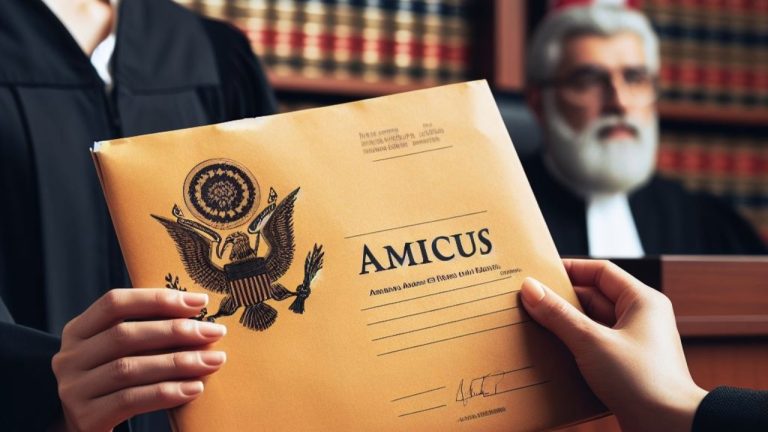 The Chamber of Digital Commerce, a Washington-based blockchain advocacy group, has filed an amicus curiae document on the SEC v Payward, Inc. (Kraken) case. The chamber argues that the actions of the SEC pose “separation of powers and due process” concerns and that digital assets are not inherently investment contracts. Chamber of Digital Commerce Slams […]
The Chamber of Digital Commerce, a Washington-based blockchain advocacy group, has filed an amicus curiae document on the SEC v Payward, Inc. (Kraken) case. The chamber argues that the actions of the SEC pose “separation of powers and due process” concerns and that digital assets are not inherently investment contracts. Chamber of Digital Commerce Slams […]
The chief executive of the Chamber of Digital Commerce says that Bitcoin (BTC) could hit a seven-figure price tag by 2029 if adoption continues at the current rate. In a new interview on CNBC Television, Perianne Boring, the crypto advocacy group’s founder and CEO, says that BTC’s fair value price is likely already somewhere between […]
The post Bitcoin Could Hit $1,000,000 a Coin by 2029, Says Chamber of Digital Commerce CEO – Here’s Why appeared first on The Daily Hodl.

With more than a month left before the end of 2023, the United States crypto industry has already spent $20 million on lobbying efforts.
With more than a month left before the end of 2023, the United States crypto industry has already spent $20 million on lobbying efforts. In the last year, the total sum stood at $22.2 million.
According to the CoinGecko report, published on Nov. 14, the U.S. crypto lobby has spent $20.19 million in 2023 to date, and this data doesn’t include the Q4 numbers. That means the total amount of lobby spending this year would probably exceed last year’s numbers, which were an absolute record for the American crypto industry.
Between 2019 and 2020, the total lobbying budget of the U.S. crypto companies fluctuated between $2.5 million and $3 million, which accounted for less than 3% of the Wall Street companies’ lobbying expenses. In 2021, this number surged to $8.5 million; in 2022, it reached the $22 million mark. To date, this year crypto lobbying spending has amounted to 19.7% of Wall Street lobbying.
Related: Crypto advocates file amicus brief to address users’ Fourth Amendment privacy rights
The number of companies involved in lobby spending hasn't changed significantly compared to last year — with 56 this year versus 57 in 2022. It’s still way more than in 2021 (37 companies), 2020 (17) or 2019 (19).
Coinbase has been the leader in spending efforts for 2019-2023, with $7.5 million spent. The second place belongs to the non-commercial Blockchain Association, with $5.23 million spent. Ripple follows in third place, with $3.46 million in crypto lobbying expenditure. The list of organizations that have consistently participated in lobbying efforts includes the Chamber of Digital Commerce, the Bitcoin Association and Anchorage Digital.
The study dataset excluded cases of mixed spending on crypto and non-crypto issues, such as the lobbying efforts from PayPal, JP Morgan, IBM and other companies now involved in the digital assets economy.
Cointelegraph reached out to CoinGecko for further details on the methodology of the research.
Magazine: Breaking into Liberland: Dodging guards with inner-tubes, decoys and diplomats

A crypto lobbying group is petitioning the courts in favor of Binance in the exchange’s lawsuit with the U.S. Securities and Exchange Commission (SEC). In an amicus briefing filed yesterday, the Chamber of Digital Commerce told the U.S. District Court of Columbia that the US, once a haven for new tech, is pushing away crypto and blockchain […]
The post Crypto Lobby Group Files Amicus Brief in SEC Lawsuit Against Binance, Likens Exchange to E-Commerce Giant Amazon appeared first on The Daily Hodl.

The new advocacy group already represents over half the country’s Bitcoin hash rate and will seek to shape energy policy and champion Bitcoin and blockchain.
Cryptocurrency miners have a new voice in Washington with the launch of the Digital Power Network (DPN), a new coalition affiliated with the Chamber of Digital Commerce. The network is off to a promising start, with many of the United States’ biggest miners on board.
The DPN is the first affiliate of the Chamber, and shares many of the same team members. Its origins stretch back to the Chamber’s Mining Initiative, which “pioneering the introduction of the first pro-proof-of-work resolution in the U.S. House of Representatives.”

Alena Ricci, vice present of marketing at the Chamber and head of marketing at the DPN, explained to Cointelegraph that the resolution was submitted by Texas congressman Pete Sessions in March. “Bitcoin Mining will play a critical role in rebuilding energy independence in the USA,” Sessions tweeted at the time.
Related: Micro $3 Bitcoin miners won’t make bank, but that’s not the point — Inventors
The DPN is debuting with 11 members – Argo, BitDigital, BitFarms, Coinmint, Cipher Mining, DigitHost, Hive, Marathon, Riot, Sustainable Bitcoin Protocol and Terawulf. Together they represent over 50% of the U.S. Bitcoin (BTC) hash rate, the DPN said. According to a statement:
“The Digital Power Network spearheads policy advocacy for digital asset mining and shapes the future of energy policy. Its mission is to champion Bitcoin and blockchain technology to revolutionize energy markets.”
The DPN has its work cut out for it. A bill reintroduced into Congress in March, prior to Sessions’ resolution, would require the Environmental Protection Agency to investigate crypto miners. The Biden Administration included a 30% tax on electricity used by crypto miners in its FY2024 budget, although that proposal may have been dropped.
Exciting News!
— Perianne (@PerianneDC) September 19, 2023
Today, we're thrilled to announce the launch of @digitalpowerUS, a visionary consortium that's set to revolutionize the energy landscape! Representing over 50% of U.S. #Bitcoin Hash Rate, this initiative is a game-changer for the future of energy policy. pic.twitter.com/8wtpRy1dyD
The DPN will work alongside the Digital Energy Council, a lobbying group founded in August by former Chamber director of energy policy Thomas Mapes.
Magazine: Bitcoin is on a collision course with ‘Net Zero’ promises

The Chamber of Digital Commerce has urged Congress to set up a Digital Asset and Blockchain Technology Solarium Commission to develop crypto regulation.
A blockchain lobbying group backed by the likes of Goldman Sachs, Citi Group, Circle, and Fidelity has urged the United States Congress to pass a legal framework for digital assets or risk falling behind other nations.
On May 19, the U.S. Chamber of Digital Commerce sent a call to action to Congress and the Senate to prioritize passing a national approach to crypto regulation.
The organization added that it requests that Congress organize a “Digital Asset and Blockchain Technology Solarium Commission” to develop a “national strategic approach to digital assets and blockchain technology” in the U.S.
There was a stark warning that failure to act would enable “adversarial nations” to further their activities in the space that “endanger U.S. leadership and dollar primacy.”

It mentioned China as an example of such adversarial action with the development of an internationally focused Blockchain-based Services Network (BSN) to “incorporate global development and trade and fill the U.S.-created vacuum.”
It also cited the growing number of countries considering or choosing to trade with China directly in yuan and ditching the U.S. dollar. These include Saudi Arabia, Russia, France, Brazil, and India, it wrote.
Today, the @DigitalChamber issued a call to action urging Congress to organize a Digital Asset and Blockchain Technology Solarium Commission to develop a national strategic approach to these technologies in the U.S.
— Chamber of Digital Commerce (@DigitalChamber) May 18, 2023
Let's ensure U.S. leadership in the #blockchain industry.
On a similar note, the organization mentioned the potential BRICS digital currency and other developments regarding gold-backed digital currencies by Russia and Iran.
The brief concluded that regulatory and legal opacity in the U.S. is “hampering the nation’s ability to lead and take advantage of this innovation revolution,” adding:
“This abdication is severely hampering domestic development and ceding advantages to other nations at the expense of the U.S. innovator and investor.”
The name of the proposed commission references Project Solarium which was created in the wake of World War II and the dawning of the Cold War by President Eisenhower to counter the threat of Soviet expansion.
The Cyberspace Solarium Commission, created in 2019, was created to develop a strategic approach to defend against cyber attacks. The crypto advocacy group wants a similar strategy on digital assets and blockchain technology which “desperately needs consensus in the wake of other nations’ advances.”
Related: US Chamber of Commerce slams SEC's ‘haphazard’ regulation efforts
The Chamber of Digital Commerce is an American advocacy group founded in 2014 that promotes emerging technologies in the blockchain sector.
On May 19, the group backed Senator Tom Emmer for introducing the Securities Clarity Act which aims to provide much-needed regulatory clarity for the crypto asset and blockchain industry in the U.S.
The @DigitalChamber applauds @GOPMajorityWhip for introducing The Securities Clarity Act with @RepDarrenSoto. Clear definitions of #digitalassets will provide much-needed certainty for investors, consumers, and businesses while prospering innovation in the U.S. pic.twitter.com/LuLqutVMr1
— Chamber of Digital Commerce (@DigitalChamber) May 18, 2023
Meanwhile, the Securities and Exchange Commission remains adamant that the existing rules that were formed decades ago still apply to this new form of digital finance and its underlying technology.
Magazine: $3.4B of Bitcoin in a popcorn tin — The Silk Road hacker’s story

The exchange has come under increasing pressure from critics after the collapse of its rival, FTX.
Binance has joined the Chamber of Digital Commerce, a United States crypto industry lobbying group, according to a Dec. 20 press release from the exchange. The move comes after Binance has been criticized for allegedly being unregulated.
Binance’s vice president of public affairs Joanne Kubba expressed hope that the partnership would help lead to clear regulations for the crypto industry in the U.S., stating:
“As an organization at the crux of the industry's rapid growth and complex regulatory environment, working hand in glove with policymakers, regulatory bodies and industry groups like the Chamber is imperative for Binance. Such work is fundamental to our shared mission of fostering the sustainable development of sensible regulations for cryptocurrency and blockchain, which ultimately ensures protections for users.”
According to its website, the Chamber of Digital Commerce advocates for a variety of public policies, including tax parity for digital assets, AML/KYC regulations for crypto exchanges, increased regulatory clarity for security tokens, and central bank digital currency (CBDC) research, among others.
Through its political action committee (PAC), the Chamber made contributions to three congressional candidates in 2022: Patrick McHenry (R-NC), Blake Masters (R-AZ), and Ron Wyden (D-OR).
Related: New House Financial Services Committee chair wants to delay crypto tax changes
Since the collapse of FTX, calls for crypto regulation have increased, and Binance has come under special scrutiny for being a high-volume exchange that has no clear geographical location or regulatory status.
In a Congressional hearing on Dec. 14, Kevin O’Leary claimed that Binance caused the collapse of FTX and is an unregulated monopoly.
Binance’s CEO, Changpeng Zhao, responded to O’Leary’s claims in a Dec. 15 CNBC interview, calling them “a bunch of nonsense claims.”
On Dec. 12, Reuters released a report claiming that U.S. Justice Department officials were deciding whether to charge Binance executives with financial crimes. The executives have not been charged so far, but the report led to large outflows of stablecoin and other cryptos from Binance.
In order to prove that it is trustworthy and solvent, Binance has released an audited proof-of-reserve. However, the proof-of-reserve has been criticized for not disclosing Binance’s corporate structure or internal controls.
Binance.US, a separate exchange with the same namesake as the global trading platform, had previously joined the Chamber of Digital Commerce in 2020. Its rival, FTX, was also a contributor to U.S. politicians. But this appears to be the first time the international Binance organization has directly joined a U.S. lobbying group.

The Chamber of Digital Commerce asked to file an amicus brief in the protracted SEC case against Ripple Labs and supports legislating to clear up a legal gray area.
The Chamber of Digital Commerce (CDC) has requested to file an amicus brief in the case of the United States Securities and Exchange Commission v. Ripple Labs and its executives Bradley Garlinghouse and Chris Larsen. Liliya Tessler of the firm Sidley Austin filed a package of documents, including the proposed brief, with the U.S. District Court of the Southern District of New York on Wednesday.
The CDC is the world’s largest blockchain and digital asset trade group, with over 200 members that include industry players, investors and law firms. It argued that the Chamber does not have “a view on whether the offer and sale of XRP is a securities transaction,” but it is interested in “ensuring that the legal framework applied to digital assets underlying an investment contract is clear and consistent,” adding:
“Maintaining this distinction is critical to developing a predictable legal environment through a technology-neutral precedent, which this Court has the power to do.”
The documents later restate the question as “whether the well-settled law applicable to the offer and sale of an investment contract that is a securities transaction is properly distinguished from the law applicable to secondary transactions in digital assets that were previously the subject of an investment contract” in light of the fact that “no federal law (or regulation) specifically governs the legal characterization of digital assets recorded on a blockchain.”
The Chamber is wading into the Ripple v. SEC case.
— Jeremy Hogan (@attorneyjeremy1) September 11, 2022
Expect something similar to what it filed in the Telegram case and the argument is that although the SALE of XRP might have been as a security, the token is not inherently a security.
Similar to JDeaton, just not as compelling. https://t.co/D7m0kxKdp6
In the proposed amicus brief, the CDC acknowledges the “fact-intensive” Howey test, which:
“is at times difficult for even experienced lawyers to apply, let alone market participants without legal training.”
The CDC asked the court to reiterate the difference between contracts that are securities and the subjects of those contracts, which are not securities. The cases cited include a hodgepodge of subject items, as is already customary in these discussions. Here, cases involving whiskey casks, payphones, condominiums and beavers were mentioned.
Related: SEC objects to XRP holders aiding Ripple defense
The CDC continued its argument saying that the SEC has “commendably provided guidance on the application of securities laws,” but “the SEC’s enforcement approach, similarly based on Howey, paints a different picture” and the agency has failed to provide guidance to market participants who have requested it.
The CDC continues that the SEC is using in its case against Ripple a novel application of contract analysis of secondary transactions with assets subject to an investment contract, but has not provided guidance on how to apply that analysis. Nonetheless, the SEC still expects market participants to determine whether or not an asset is a security.
The CDC noted the lack of precedent on secondary transactions with the subjects of securities contracts but stated:
“The Chamber believes that, as long as the underlying asset does not include financial interests, such as legal rights to debt or equity, digital assets are presumed to be commodities.”
The CDC noted that the proposed Lummis-Gillibrand Responsible Financial Innovation Act (RFIA) took the same stance when it introduced the concept of “ancillary assets” into consideration. Furthermore:
“The Chamber respectfully asks that this Court draw upon the principles set forth in RFIA for guidance if it decides to clarify the characterization of digital assets, which are the subject of an investment contract or defer such a decision to the legislature.”

A crypto lobbyist group is telling the U.S. Securities and Exchange Commission (SEC) that its inconsistent policies render it difficult to create a Bitcoin (BTC) exchange-traded fund (ETF). In a new report, the Chamber of Digital Commerce says it’s time for the SEC to approve a Bitcoin ETF after it rejected numerous bids throughout the […]
The post Crypto Lobbyist Group Tells SEC Its Time for Bitcoin ETF, Says Regulator Is Inconsistent With Policy appeared first on The Daily Hodl.

“As the SEC continues to stonewall, the United States continues to fall further behind other countries as capital that would have been invested in the United States," said the CDC.
The crypto advocacy group Chamber of Digital Commerce called on the Securities and Exchange Commission, or SEC, to approve applications for Bitcoin exchange-traded funds in the interests of United States-based investors.
In a Monday report titled ‘The Crypto Conundrum’, the Chamber of Digital Commerce said the U.S. has fallen behind other countries around the world whose residents have access to crypto investment vehicles including Bitcoin (BTC) ETFs. The crypto advocacy group added there were “no reported instances of hacking or theft and no indications of market manipulation” related to Bitcoin ETFs released abroad, suggesting the SEC’s reasoning in previously rejecting applications was “misguided and counterproductive.”
“As the SEC continues to stonewall, the United States continues to fall further behind other countries as capital that would have been invested in the United States, which would be managed by U.S. firms employing U.S. persons, is instead deployed in other, more innovation-friendly countries,” said the Chamber of Digital Commerce — naming Canada, Germany, Sweden, Switzerland, and Australia.
The time has come for US investors to have access to an ETF that directly holds #bitcoin.
— Chamber of Digital Commerce (@DigitalChamber) September 12, 2022
Download The Crypto Conundrum to read the full saga.https://t.co/jJwWcAW8IT pic.twitter.com/UPT6V2AlJ6
The crypto advocacy group pushed back against the SEC citing its obligation to protect investors in denying the approval of a Bitcoin ETF, saying its actions encouraged investors “to acquire their exposure [to crypto] in a less regulated and/or foreign environment where they are much more susceptible to unscrupulous actors and the risks of self-custody.”
“The SEC has now positioned itself as a merit regulator on this matter. It has determined that the American public cannot yet handle the responsibility of familiar, cost-effective, liquid, transparent and regulated access to the Bitcoin markets. Unfortunately, the cost of this position has fallen, and will continue to fall, on U.S. investors and the U.S. capital markets.”
“We can’t deny the huge demand for exposure to this new and innovative asset class,” said Chamber of Digital Commerce founder and CEO Perianne Boring in a Monday interview on Fox Business. “You would think that our regulators would be working with the industry to bring regulated products to the market for retail investors, but they’ve been stopped at every attempt over the past decade.”
According to the report, part of the motivation behind the SEC continuing to deny BTC ETF applications may be political. The CDC said SEC chair Gary Gensler’s efforts to expand the authority of the regulatory body to include many crypto products was effectively a “jurisdictional land grab.” The group claimed his positions also cut off much of the engagement between regulators and token issuers.
Related: SEC could approve spot Bitcoin ETFs as early as 2023 — Bloomberg analysts
To date, the U.S. financial regulator has turned down spot Bitcoin ETF applications from 16 companies, often citing the proposed rule changes allowing exchanges to list the investment vehicle were not “designed to prevent fraudulent and manipulative acts and practice.” The CDC report claimed that advocacy groups had made “little, if any, progress” in convincing the SEC to change its position on the matter, saying “the United States is no closer to having a Bitcoin ETF than when Cameron and Tyler Winklevoss filed the first registration statement for a Bitcoin ETF in 2013.” However, the SEC has given the green light to several ETFs linked to BTC futures.